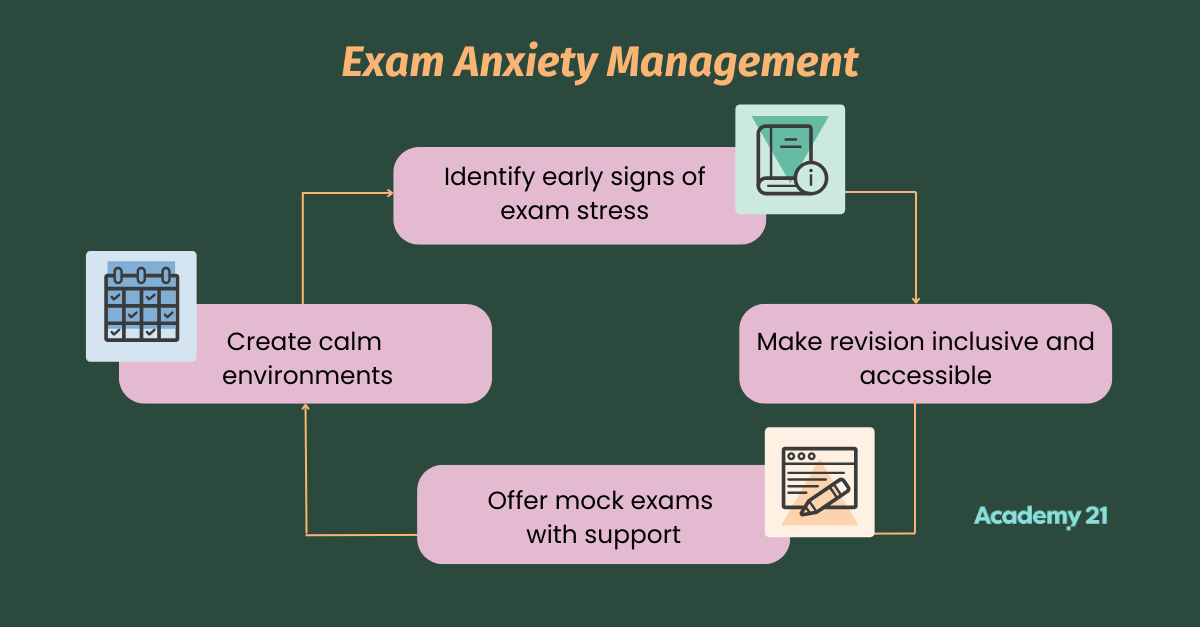Exam anxiety management: How to help students tackle exam anxiety

For many students, the pressure to perform academically leads to stress levels that can seriously impact wellbeing, academic progress, and long-term mental health. In the 2023–24 academic year, over 204,000 children aged 17 or under were referred to NHS mental health services for anxiety, more than doubling the number from 2019–20. With the high-stakes exam season already underway, the pressure on students is mounting, making effective exam anxiety management more critical than ever.
What is exam anxiety?
Exam anxiety is a type of performance anxiety that arises before, during, or even after exams. It often results in physical symptoms like headaches, nausea, and fatigue, alongside emotional reactions such as panic, irritability, and low self-esteem.
Students experience exam-related stress for a variety of reasons, including:
- Fear of failure and its perceived consequences
- Pressure from parents, teachers, or peers
- Perfectionism or excessively high self-expectations
- Lack of preparation or poor study habits
- Previous negative experiences in exams
- Learning differences, ADHD, autism, or anxiety disorders
Each student’s experience is different. For some students, this stress is temporary. For others, without effective exam anxiety management, it can become overwhelming, leading to poor performance, disengagement from school, or longer-term mental health issues.
Why is exam anxiety management important?
85% of UK students experience some form of exam-related stress. This anxiety can severely impact their academic progress and performance, leading to difficulties in concentration, memory recall, and overall exam results.
But beyond academic outcomes, unmanaged exam anxiety can have long-term effects on students’ mental health. ASCL reported that over three-quarters of teachers observed mental health issues related to exam anxiety among their Year 11 students, with many requiring alternative arrangements during exams.
Addressing anxiety through targeted strategies can help reduce these pressures, ensuring that students perform at their best while safeguarding their mental health.
1. Identify early signs of exam stress
School staff are often the first to notice changes in a student’s behaviour. However, while some students may speak openly about their worries, many internalise their stress. Here are some warning signs to look for:
- Complaints of physical illness before tests
- Sleep disturbances or changes in eating habits
- Avoidance of school or exam-related conversations
- Sudden dips in performance or concentration
- Emotional outbursts or withdrawn behaviour
Generally, anxiety around exams can manifest as avoidance, irritability, perfectionism, poor concentration, or even physical complaints such as headaches or nausea. Embedding regular check-ins, tutor time reflections, or simple mood tracking tools can help identify students who may be struggling before the pressure escalates.
2. Train staff to recognise and respond
A whole-school approach to exam anxiety starts with confident, informed staff. Provide training on how anxiety presents in different students and practical classroom techniques to de-escalate stress. Equip teachers with strategies such as flexible deadlines for internal assessments, supportive questioning styles, and body language and tone awareness. Consistency across departments helps build a predictable, safe environment for anxious students.
3. Make revision inclusive and accessible
Not all students know how to revise effectively, and for those with anxiety, unstructured revision can feel overwhelming. Schools can support students by offering timetabled revision sessions, study skills workshops, and resources that model techniques such as retrieval practice and spaced learning. Consider quiet, drop-in revision spaces during breaks or after school for students who struggle to study independently at home.
4. Review the internal assessments calendar
Too many high-stakes assessments in a short period can cause unnecessary stress. Audit your school’s internal exam calendar to avoid avoidable clashes or overcrowding. If possible, stagger internal deadlines and offer flexibility for students with identified anxiety or health needs. Some schools also explore alternative methods for assessing progress outside of formal exam conditions to reduce cumulative pressure.
5. Offer mock exams with support
Mock exams are essential for building familiarity with the assessment process, but without the right support, they can also exacerbate anxiety. Provide pre-mock workshops to walk students through what to expect, what to bring, and how the marking will be used. Afterwards, use feedback sessions to focus on growth and strategies rather than raw grades. Some schools also allow more than one mock attempt to give students a second chance to apply what they’ve learned.

6. Create calm environments
Exam halls can trigger panic in students with severe anxiety or related conditions. Work with your SENCO and pastoral leads to identify students who might benefit from smaller rooms, additional breaks, or supervised one-to-one spaces. Even subtle adjustments — like providing noise-cancelling headphones or offering an extra five minutes to read the paper — can make a meaningful difference.
7. Promote open, non-judgmental conversations
A culture of openness can significantly reduce stigma around anxiety. Use assemblies, tutor time, or PSHE to normalise exam nerves and teach coping strategies. Ensure students know who they can go to for support — whether that’s a named member of staff, a counsellor, or a wellbeing lead. Encouraging conversations about mental health not only supports students but also helps shift whole-school culture.
Specialist support for students with severe exam anxiety
For many students, especially students with SEN, emotionally based school avoidance (EBSA), or medical needs, the traditional classroom environment can heighten anxiety. In these cases, alternative provision may offer the space and support they need to re-engage with learning and sit their GCSE exams with greater confidence.
At Academy21, we offer a calm, supportive space where students can learn at their own pace, with live online lessons in small groups, 24/7 access to class recordings, and personalised attention from experienced teachers.
Our curriculum is carefully mapped to the core GCSE specifications. But more than offering DfE-accredited, comprehensive education, we help students build confidence in their abilities. Real-time feedback, structured revision techniques, and our intelligent Inspired AI platform all contribute to a deeper understanding of subjects, and crucially, reduce the fear of the unknown when it comes to exams.
What to do if things go wrong
Even with intense preparation, things don’t always go to plan. For students who experience setbacks close to their final year, our GCSE Booster programme can be a valuable second chance. This condensed course helps students rebuild essential knowledge and develop effective exam techniques, even if they’ve missed a significant portion of their Key Stage 4 education.
Whether students are learning at home or in supervised on-site settings, they continue to receive high-quality teaching and a structured routine, both of which are vital for rebuilding confidence and reducing anxiety.
Ultimately, our goal is to ensure that every student feels supported, regardless of their starting point. Whether it’s building a solid foundation from the outset or offering a way back after things go wrong, Academy21 provides a safe and effective route through exam anxiety and towards meaningful outcomes.
Offering students another way
The reality is that exam periods are challenging for many students, but with thoughtful, well-planned exam anxiety management, they don’t have to suffer in silence or struggle alone. By identifying issues early, implementing practical strategies, and creating the right learning environment, we can help students approach assessments with confidence and calmness.
If your school is working with students experiencing anxiety around exams or needing support to complete their GCSE years and take their next educational step, Academy21 can help. Contact our team below.



